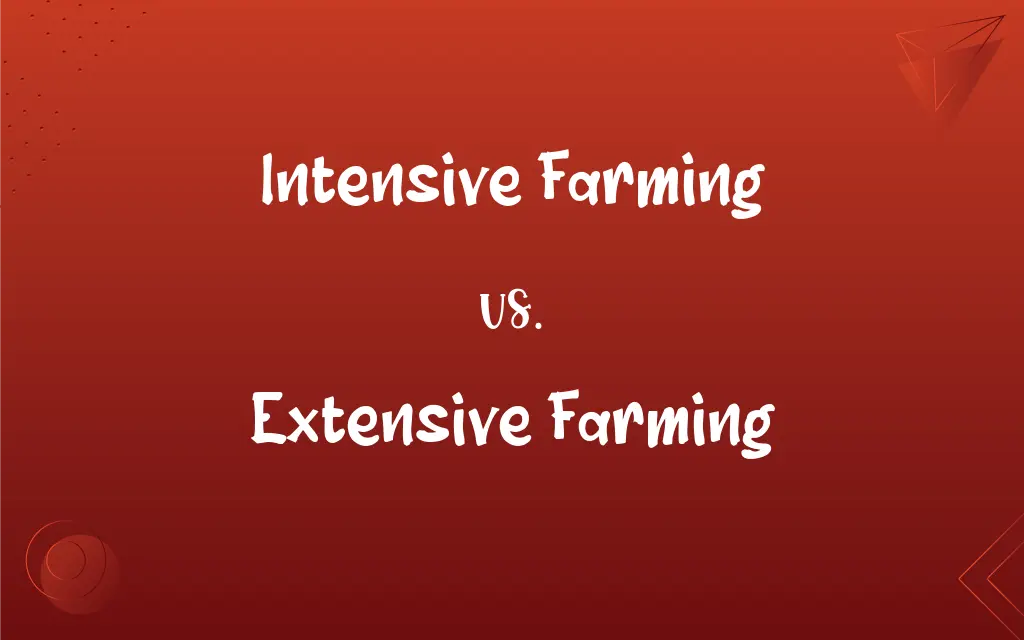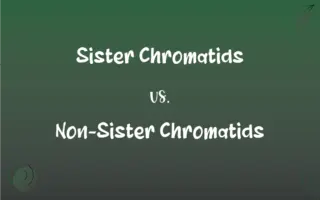Intensive Farming vs. Extensive Farming: What's the Difference?
Edited by Janet White || By Harlon Moss || Updated on October 15, 2023
Intensive farming focuses on maximizing output from a small land area; extensive farming uses large areas with minimal inputs.

Key Differences
Intensive farming and extensive farming represent contrasting agricultural approaches with distinct methodologies and objectives. Intensive farming emphasizes maximizing agricultural output from a relatively smaller area. This method often relies on technological advancements, pesticides, fertilizers, and increased labor to achieve its goals. In contrast, extensive farming is characterized by the use of larger tracts of land, producing crops or rearing livestock with minimal inputs, such as fertilizer or labor.
The environmental impacts of intensive farming and extensive farming also differ. Intensive farming, with its heavy reliance on chemical fertilizers, pesticides, and mechanization, can lead to soil degradation, water pollution, and reduced biodiversity. Extensive farming, on the other hand, has fewer direct environmental impacts due to its lower input use but can lead to land degradation if overgrazing occurs.
From an economic perspective, intensive farming typically requires a higher capital investment due to the need for advanced equipment, high-quality seeds, and more. The returns, however, can be significantly higher due to increased yields. Extensive farming requires less investment, primarily in land, and has potentially lower returns due to its lower intensity of production.
In terms of labor requirements, intensive farming demands more hands-on involvement, constant monitoring, and management. It often requires skilled labor knowledgeable about the latest farming techniques. Extensive farming, in its traditional form, requires fewer workers, given the expansive nature of the land and lower input needs.
Historically, the rise of intensive farming can be attributed to the need to meet the food demands of growing populations in urbanized areas. The approach prioritizes efficiency and yield. Extensive farming, traditionally seen in pastoral communities and certain crop-growing regions, has been practiced for centuries, utilizing vast areas to support livestock and cultivate crops without overburdening the land.
ADVERTISEMENT
Comparison Chart
Land Use
Small land area with high yield.
Large tracts of land with lower yield per acre.
Input Usage
High use of inputs like fertilizers and pesticides.
Minimal inputs, more reliance on natural processes.
Labor Requirement
High, often skilled labor.
Lower, with less hands-on management.
Environmental Impact
Potential for soil degradation, water pollution.
Risk of overgrazing, less direct chemical impact.
Economic Investment
Higher due to technology and inputs.
Lower, primarily in land acquisition.
ADVERTISEMENT
Intensive Farming and Extensive Farming Definitions
Intensive Farming
An agricultural system that seeks to maximize yield from a small area.
The rise of urban populations has increased the practice of intensive farming.
Extensive Farming
Farming that prioritizes land area over intensive management.
Given the abundance of land, the farmer chose extensive farming over intensive methods.
Intensive Farming
Agriculture that requires constant management and monitoring.
Farmers practicing intensive farming often work longer hours.
Extensive Farming
Agriculture where livestock roam over large areas for grazing.
The cattle were reared using extensive farming methods, roaming freely over vast pastures.
Intensive Farming
A system that emphasizes efficiency and high productivity.
The goal of intensive farming is to produce the maximum amount of food from a minimal land area.
Extensive Farming
Farming that relies more on natural processes and less on chemicals.
Extensive farming can be seen as a more traditional form of agriculture.
Intensive Farming
Farming that heavily relies on inputs like fertilizers and pesticides.
Intensive farming has led to increased crop production in recent decades.
Extensive Farming
Agriculture that uses large areas of land with minimal inputs.
Many ranchers in the American West practice extensive farming.
Intensive Farming
A method characterized by high capital and labor investment.
Modern equipment has become indispensable for intensive farming.
Extensive Farming
A system that requires fewer workers due to its expansive nature.
The vast fields of Australia are often used for extensive farming.
FAQs
Which farming method relies more on chemical inputs?
Intensive farming relies more on chemical inputs like fertilizers and pesticides.
Why has intensive farming gained popularity?
It has risen to meet the food demands of growing urban populations.
Is extensive farming traditional or modern?
Extensive farming is often seen as a more traditional form of agriculture.
Which farming method is more capital-intensive?
Intensive farming typically requires a higher capital investment.
Can extensive farming feed large populations?
It can, but it may require more land area to produce the same amount of food as intensive methods.
What is the primary focus of intensive farming?
Intensive farming focuses on maximizing yield from a small land area.
What is the economic return comparison between the two methods?
Intensive farming can yield higher returns due to increased productivity, while extensive farming may have lower returns per acre.
How do the two methods impact biodiversity?
Intensive farming can reduce biodiversity, while extensive farming, if not overdone, can support diverse ecosystems.
In what regions is extensive farming commonly practiced?
It's commonly practiced in areas with vast land, like Australia or the American West.
Are there hybrid methods combining features of both?
Yes, some farmers combine intensive and extensive practices to balance productivity with sustainability.
Is extensive farming more environmentally friendly?
Extensive farming has fewer direct chemical impacts but can lead to land degradation if not managed properly.
Can intensive farming lead to environmental issues?
Yes, it can lead to issues like soil degradation and water pollution.
How does extensive farming impact soil quality?
With proper management, it can maintain soil quality; overgrazing, however, can degrade it.
Are there organic methods of intensive farming?
Yes, organic intensive farming avoids synthetic chemicals but still aims for high yields.
How does extensive farming differ in terms of land use?
Extensive farming uses larger tracts of land with fewer inputs.
Which farming approach requires more labor?
Intensive farming typically demands more hands-on labor.
Does intensive farming always involve the use of chemicals?
Not always, but it often involves higher input usage.
Which farming method is more sustainable?
It depends on the practices; both can be sustainable if managed properly.
What are the primary crops grown using intensive farming?
It varies but can include grains, vegetables, and fruits that demand high yields.
Does extensive farming require high-tech equipment?
Not necessarily, it often relies on traditional methods and minimal equipment.
About Author
Written by
Harlon MossHarlon is a seasoned quality moderator and accomplished content writer for Difference Wiki. An alumnus of the prestigious University of California, he earned his degree in Computer Science. Leveraging his academic background, Harlon brings a meticulous and informed perspective to his work, ensuring content accuracy and excellence.
Edited by
Janet WhiteJanet White has been an esteemed writer and blogger for Difference Wiki. Holding a Master's degree in Science and Medical Journalism from the prestigious Boston University, she has consistently demonstrated her expertise and passion for her field. When she's not immersed in her work, Janet relishes her time exercising, delving into a good book, and cherishing moments with friends and family.































































